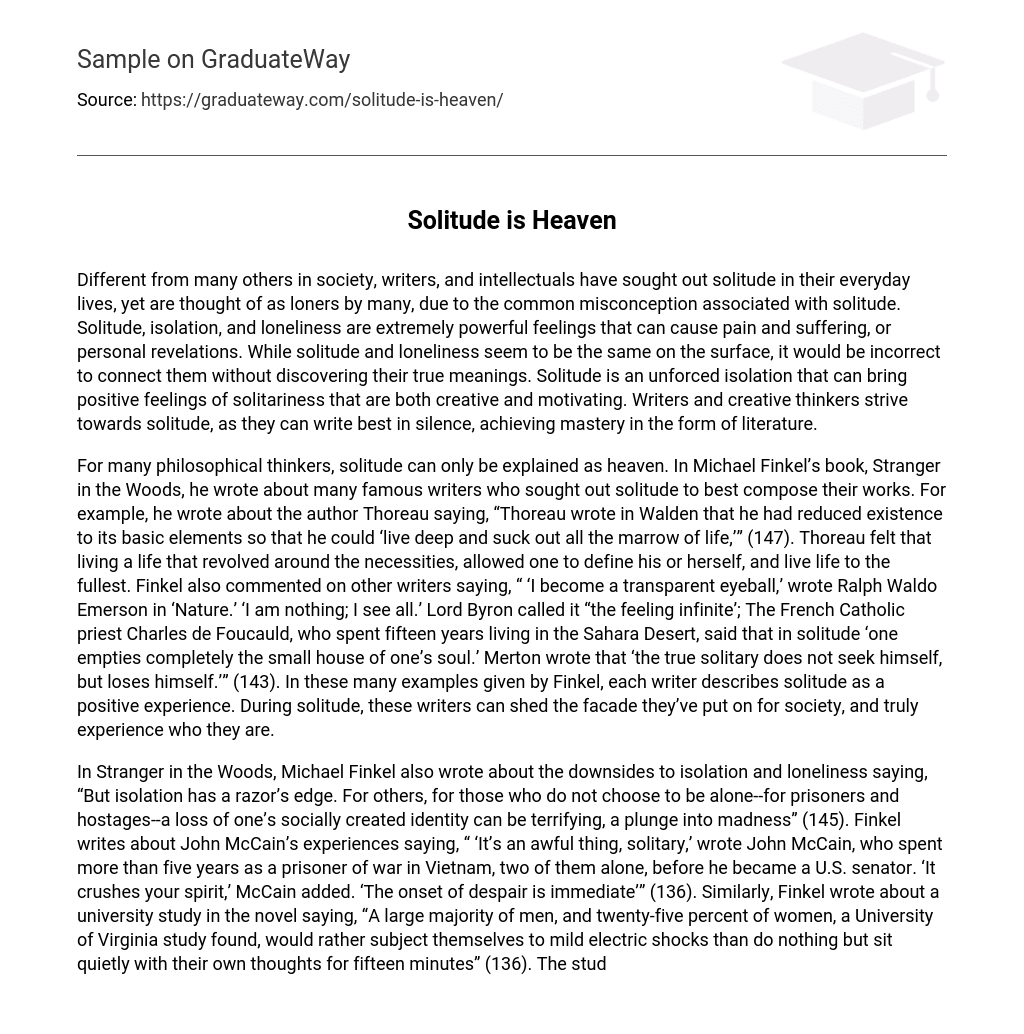Different from many others in society, writers, and intellectuals have sought out solitude in their everyday lives, yet are thought of as loners by many, due to the common misconception associated with solitude. Solitude, isolation, and loneliness are extremely powerful feelings that can cause pain and suffering, or personal revelations. While solitude and loneliness seem to be the same on the surface, it would be incorrect to connect them without discovering their true meanings. Solitude is an unforced isolation that can bring positive feelings of solitariness that are both creative and motivating. Writers and creative thinkers strive towards solitude, as they can write best in silence, achieving mastery in the form of literature.
For many philosophical thinkers, solitude can only be explained as heaven. In Michael Finkel’s book, Stranger in the Woods, he wrote about many famous writers who sought out solitude to best compose their works. For example, he wrote about the author Thoreau saying, “Thoreau wrote in Walden that he had reduced existence to its basic elements so that he could ‘live deep and suck out all the marrow of life,’” (147). Thoreau felt that living a life that revolved around the necessities, allowed one to define his or herself, and live life to the fullest. Finkel also commented on other writers saying, “ ‘I become a transparent eyeball,’ wrote Ralph Waldo Emerson in ‘Nature.’ ‘I am nothing; I see all.’ Lord Byron called it “the feeling infinite’; The French Catholic priest Charles de Foucauld, who spent fifteen years living in the Sahara Desert, said that in solitude ‘one empties completely the small house of one’s soul.’ Merton wrote that ‘the true solitary does not seek himself, but loses himself.’” (143). In these many examples given by Finkel, each writer describes solitude as a positive experience. During solitude, these writers can shed the facade they’ve put on for society, and truly experience who they are.
In Stranger in the Woods, Michael Finkel also wrote about the downsides to isolation and loneliness saying, “But isolation has a razor’s edge. For others, for those who do not choose to be alone–for prisoners and hostages–a loss of one’s socially created identity can be terrifying, a plunge into madness” (145). Finkel writes about John McCain’s experiences saying, “ ‘It’s an awful thing, solitary,’ wrote John McCain, who spent more than five years as a prisoner of war in Vietnam, two of them alone, before he became a U.S. senator. ‘It crushes your spirit,’ McCain added. ‘The onset of despair is immediate’” (136). Similarly, Finkel wrote about a university study in the novel saying, “A large majority of men, and twenty-five percent of women, a University of Virginia study found, would rather subject themselves to mild electric shocks than do nothing but sit quietly with their own thoughts for fifteen minutes” (136). The study’s results can be attributed to the thoughts of many evolutionary biologists, as Finkel also wrote, “Many evolutionary biologists believe that early humans thrived, despite being weaker and slower than other animals, chiefly due to their superior ability to work together. Human brains are wired to connect…” (137). Although loneliness is dangerous, solitude, a chosen aloneness, can be reinvigorating. Many believe that it is important to be with others all the time, yet when spending time with others, it is difficult to discuss your inner emotions and thoughts with yourself. Some, if not most of your original thoughts, are suppressed, as humans naturally feel the need to conform to other’s ideas.
When people assume that solitude is detrimental to their mental health, their misconception prevents them from learning about themselves. This has been true throughout the history of literature as writers who seek solitude can best achieve mastery in their writing. Therefore, it is imperative that intellectual thinkers seek out solitude, as it allows them to formulate original ideas, without any preconceived notions from others.





